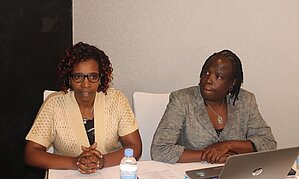Rwanda Convenes National Consultative Workshop on Food and Cosmetic Products Cross-Border Trade

Ms Athanasie Mukeshiyaremye and Ms Stella, EAC Secretariat representative
Today, 4th March 2019, a Trade Mark East Africa (TMEA)-supported three-day national consultative workshop started at the Park Inn by Radisson Blu Hotel in Kigali. This National Consultative Workshop for Inter-Agency Regulatory Control for Food and Cosmetics is an inter-agency event bringing together multiple regulators in different commodities particularly from the government and private sector institutions.
This is the workshop that has been convened as a result of East African Community Standards Committee (EACSC)’s recommendation made at its 21st meeting held in Arusha - Tanzania from 26th to 27th April 2018, which while recognizing the value of mandatory requirements for standards, food safety controls, and conformity assessment policies and practices in achieving adequate protection of people, the environment, and other essential interests of society, also noted that their potential to create barriers to trade remained an issue of concern.
Particular attention was paid to food and cosmetic products that are regulated differently in each of the Partner States both in terms of the institutional set up and regulatory requirements for compliance. In some Partner States, for example, these products are regulated by more than one regulator with each having different requirements. The EASC meeting noted that those multiple regulatory requirements have created a significant obstacle to trade across borders in these products with a direct impact on the achievement of the goals of the EAC Common Market.
Participants to the workshop
The meeting therefore recommended the establishment of the task force composed of the TBT and SPS experts / other regulators including the private sector to develop guidelines/framework for facilitating cross border trade for food and cosmetic products. The Task Force was directed within six months to develop a framework for integrating the implementation of regulatory controls and measures specifically for food and cosmetic products by the relevant regulatory institutions.
On 14th-16th August 2018, the Task Force convened in Dar es-Salaam, Tanzania and agreed that each Partner State should carry out National Consultations and develop a country position on the regulatory framework; a roadmap was developed and lead institutions and persons were given the task of coordinating national consultations and come up with national positions.
Participants to the workshop
Speaking at the official opening of the workshop, Ms Athanasie Mukeshiyaremye, Ag Manager of National Standards Division reiterated:
“The objective of this workshop is to deliberate and come up with country position in regard to inter-agency regulatory control for facilitating cross border trade in food and cosmetic products. It is imperative that this meeting discusses objectively considering institutional legal framework, existing capacity, and circumventing environment to come up with a national position on cross-border trade”.
She added that EAC as regional trade block has developed guiding legal tools for trade purposes, the Partner States spend huge sums of money to develop and harmonize standards, pay membership to international standardization bodies, support accreditation schemes for testing and metrology laboratories, spend on peer assessment for certification and inspection services, but to the surprise, the legal tools that were supported by members are not honored and consequently the majority of products in the region still bear notified quality marks certified against national standards even where there is regional harmonized standard. That is a big concern for Rwanda and therefore the country advocates for the use of harmonized EAC standards to be taken on board by all Partner States.
Rwanda, despite different mandates in different institutions, promotes the idea and concept of institutional collaboration to create synergy to combat illegal products on the market simply because of the realistically existing weakness in a single institution but also to avoid different institutions merging on one private operator at different times. This has yielded fruits in single operation on multiple parameters/requirements, creating room for this operator to improve on non-conformities.
Private sector actively participates in standards development but the process is still wanting in terms of implementation or compliance to those standards. The Made-in-Rwanda Policy encompasses trade facilitation opportunities to be explored in order to promote exports.
In Rwanda and EAC’s journey to continually embracing standardization culture, Trade Mark East Africa (TMEA) is hailed for their positive attitude and support in standardization activities as well as bringing about positive change in the ease of cross border trade. TMEA’s support has strongly elevated compliance by enhancing capacity to different stakeholders performing standardization activities in public and private sectors.